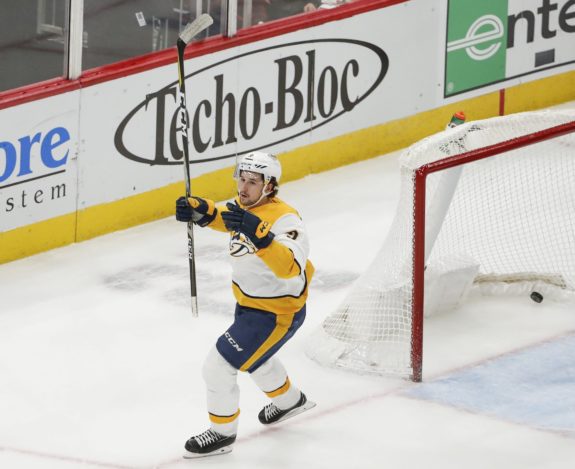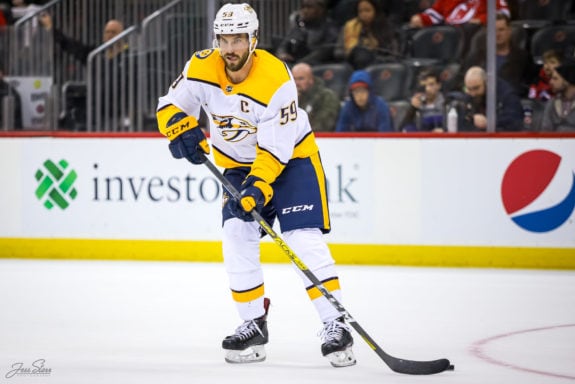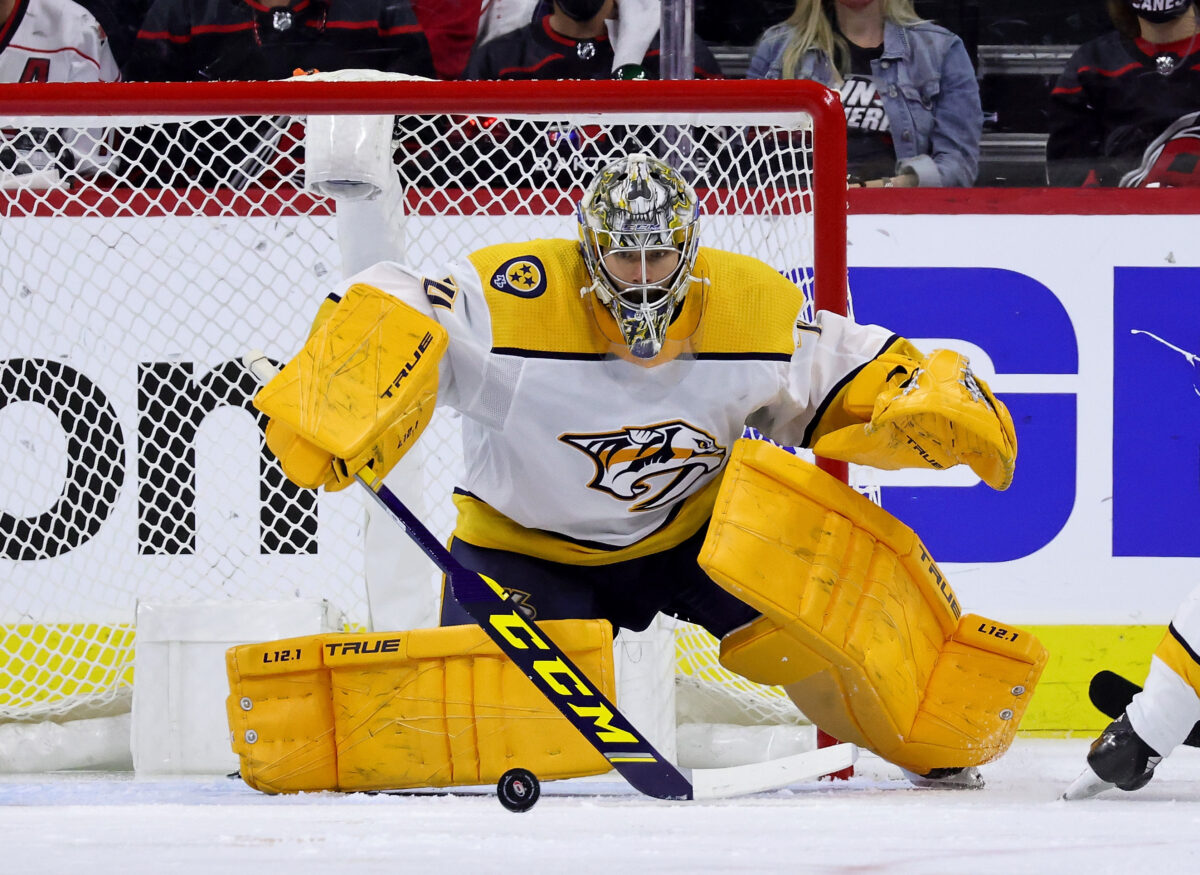The Nashville Predators got the boot in Round 1, thanks to the Carolina Hurricanes. Their offseason started much earlier than I’m sure the players wanted it to start. However, with the offseason comes looks at the overall play of the roster from top to bottom. These report cards will be looking at everyone, from the top line to The Herd Line. I’ll begin with the stars and slowly move down to the grinders and depth players. No player is exempt from a bad grade, but a bad grade is not indicative of the player’s skill or ability. These report cards must encompass the whole season within these, so just for clarity, I will be touching on the playoffs, but they won’t make a massive difference in the final grade.
Filip Forsberg
The 2020-21 season for the Predators was full of ups and downs. One player who was excellent during the Predators’ rough period at the beginning of the season was Filip Forsberg. His play was the only thing keeping the Predators relevant, as his point production was atop the league. For most of the time, he was a point or two under being a point per game until he hit the mark through 25 games with 26 points. However, his season got derailed after an injury that put him out until the first of May. Up to that point, he had 29 points in 34 games, and it didn’t look as if he was going to slow down. It was a really unfortunate turn of events, especially considering he and Eeli Tolvanen were hitting it off on the powerplay. Forsberg was the only sign of life on an otherwise dead Predators team.

His production in the playoffs was less than ideal. He did have two awe-inspiring goals, one in Game 1 that involved deking through multiple Hurricanes defenders, and he put in the other after staving off a strong hook and slash from defenseman Dougie Hamilton. The problem, however, is he looked relatively slow when looking at the overall series. It’s hard to tell if he was battling an injury or was just one step behind, but his backchecking was rough, and his passes were usually a second too slow. It’s uncharacteristic for him to think the game at a slower pace, but it was evident against the Hurricanes for whatever reason.
Forsberg’s play this season was good, but still not at the level that the Predators need it to be at if they’re going to compete for a Stanley Cup. The injury doesn’t help, but his playoffs and mediocre performance towards the end of the year hurt his grade a bit.
Overall grade: A-
Roman Josi
It’s interesting to write about Roman Josi after Forsberg because their seasons went down pretty much opposite roads. While Forsberg started the season hot, Josi didn’t and was rather underwhelming after his Norris Trophy-winning season. He had only 11 points through his first 20 games, which for Josi is not where it should be, especially considering through 17 games, he was at eight points. Before he got hurt, his point total was 16 in 25 games, which is better. The problem was his goal scoring, as over this period, he only had two.
However, after he came back from injury, the gears started to churn. He put up 17 points in 23 games, with six being goals and two of them being game-winners. It was crucial for the Predators’ mid-season turnaround that Josi turn it on too, and he did just in time. Not only was his point production up, but his skating and domination of the game were much more evident.

As for the playoffs, he put up four points and had the sweet loop pass assist on Matt Duchene‘s double-overtime winner. His play was solid offensively, but one very noticeable thing was his defense. Just like it was in the regular season, it was not great in the playoffs. He had an expected goals for percentage (xGF%) of 50.83%, and it wasn’t because of a lack of offense. He wasn’t creating as much as he probably should have, but there were many situations where he got caught looking or missed a stick check, which resulted in a high-danger chance against. It was a problem for everyone, but it happened for Josi much more than most would like it to happen.
Josi’s stretch of mediocrity in the regular season hurts his grade, but luckily for him, he was able to put good numbers up in the back half of the regular season. His playoffs weren’t anything special either, so essentially, it’s the back half of the regular season propping him up. It was a weird year so that I wouldn’t be worried about the captain’s production headed into next season.
Overall grade: B+
Ryan Ellis
Ryan Ellis‘ season was not what most expected it to be. His point production was pretty low, but his ability to create offense through intelligent passing was evident as usual. He’s an interesting anomaly analytically, as his regular goals above replacement (GAR) analytics are high, while his expected goals above replacement (xGAR) analytics are lower per Evolving-Hockey. He was sixth on the team in GAR and fifth on the team in xGAR. His numbers benefitted from not taking penalties and drawing a fair bit, but overall they were good.
His point totals, though, wouldn’t suggest the same thing. He put up 18 points in 35 games for a bit over 0.5 points per game. It was only underwhelming due to his ridiculous 38 points in 45 games output last season. His defense was a bit of an issue, but his ability to make the big plays on his end was prominent.

As for the playoffs, he was tied with Mikael Granlund for first in points with five. The point totals were a bit misleading, as his xGF% was around average like Josi, but he still made his impact felt. The one interesting thing about the playoffs that was different than the regular season for both Josi and Ellis was their pairings. They didn’t play on the same pair for most of the series like they did during the regular season. Head coach John Hynes put Ellis with Mattias Ekholm, and Josi was placed with Alexandre Carrier. It seemed to help them both, as their play got tangibly better on both ends.
Ellis’ season in total was about what we expected it to be. Not an insane amount of points, around average defensively, but a stable presence on the blue line. His injury didn’t help his production, just as it didn’t for many of the other Predators players that got hurt, but he wasn’t bad by any stretch.
Overall grade: B
Juuse Saros
Arguably the team’s MVP in the 2020-21 season, Juuse Saros put up some great numbers that launched him into Vezina consideration. His league-leading 16.06 goals saved above expected–almost five ahead of the second-highest goaltender, Connor Hellebuyck–is just one stat in a myriad of others that show how good he was. His season did get off to a rough start, but it’s nothing out of the ordinary. Saros was out for exactly two weeks after sustaining a head injury thanks to a Nino Niederreiter elbow behind the net.
After those two weeks, a switch flipped. He put up the best save percentage (.941) in the league among goalies with a minimum of 15 games played and ended with the fourth-best (.921) for the entire season. He put up multiple 40-plus and 45-plus performances that catapulted him up the starting goalie ranking chain.

His playoffs were outstanding, but he was left out to dry in many games due to lackluster defense. He put up a franchise-record 58 saves in the Game 4 double-overtime win and kept the Predators in multiple games with high-quality saves. The Predators’ loss of the series was not in any way on Saros, as he did everything possible to keep the team in the fight. He faced the most unblocked shot attempts out of any goalie in the first round and the third-highest expected goals against (xGA). He wasn’t getting any help out front, and it cost the series.
Despite the rough start at the beginning of the season, Saros was clinical in his performance overall. It’s a shame that there are only three finalists for the Vezina trophy because Saros deserves the recognition. He was the primary reason the Predators weren’t in the discussion for a lottery pick this summer. The grade I give should be pretty obvious.
Overall grade: A+
In this edition of the Predators report cards, these four players are the marquee individuals that fans tune in to watch on any given night. They needed to perform at the top of their game, which they did for the most part. They had their bumps along the way, but they were all producing at a high level at one point or another. The only thing that matters moving into next year is whether they can sustain the high level of play to help move the Predators up in a somewhat wide-open and reorganized Central Division.